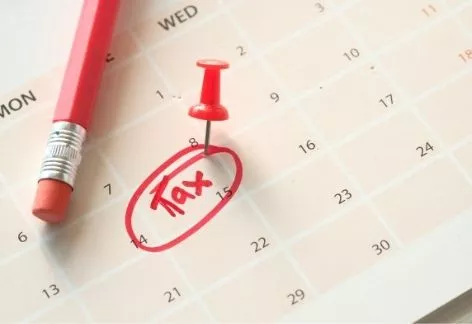Delinquent taxes can lead to dangerous consequences from the IRS, but what exactly are these taxes, and how can they negatively affect you?
Tax Day falls on mid-April nearly every year, with certain exceptions (such as 2020 and 2021, due to COVID-19). All eligible taxpayers contribute to the government’s coffers throughout the year, but Tax Day is the day every eligible American must complete and file their individual income tax returns.
These returns represent a crucial data point for the federal government, which cross-references them with information gathered from other citizens, institutions, companies, and organizations. This is how the IRS determines whether a taxpayer still owes taxes for the year, catches and corrects mistakes, or spots potential fraud. Therefore, it is every taxpayer’s duty to fill out and file their returns and do so before or on Tax Day.
Sometimes, inconsistencies, mistakes, financial changes, or even just forgetfulness on the taxpayer’s part can lead to an overdue balance on a taxpayer’s account.
Furthermore, unfiled tax returns or filing late can lead to a penalty, which can grow into substantial debt if left unpaid.
Regardless of how your tax balance grew, if the government finds that you owe unpaid or delinquent taxes, you have a short grace period before it begins levying collection actions against you and your assets and belongings.
What Are Delinquent Taxes?
Most taxpayers pay taxes on a regular basis through wage withholding or recurring payments to the government.
Delinquent taxes are often the result of:
-
-
- Unpaid late penalties;
- Unpaid taxes after the IRS discovered and corrected a mistake on your returns, or;
- An overdue balance after a profitable year, in cases where the IRS finds that your estimated payments don’t accurately reflect what you owe based on your income and deductibles.
- You may also have been marked for delinquency if you failed to meet a payment deadline.
-
The IRS does not take kindly to delinquent taxes and has the means to retaliate harshly. The IRS’s toolkit for combatting tax debt takes the form of the Collections Process and can include claiming a portion of your wages through wage garnishment, placing a tax lien on everything you own, and even selling your properties to cover your debt.
When does the IRS Send a Notice of Delinquent Taxes?
If you fail to file your tax return, the IRS will send you a notice regarding your late return and the penalties you are facing for delinquent taxes.
If your return shows that you owe taxes, the IRS will send you a bill for the due amount – as well as provide a payment deadline, giving you a window in which to cover the late amount or face late payment penalties.
These penalties stack and are unrelated to the accruing interest rate on your growing tax debt, which changes on a quarterly basis.
In general, once the IRS sends you a bill, you have limited time to act before your debt grows. It is at this point that the IRS will begin to utilize certain collection actions to coerce payment.
The tax assessment date provided on the notice of delinquent taxes from the IRS also serves as a point of reference for your tax debt’s statute of limitations, or eventual expiration date – ten years into the future.
Can I Wait Out a Tax Debt?
Tax debt lasts ten years, plus any tolling periods (such as military deferment, bankruptcy, entering a payment plan, and anything else that keeps the IRS from utilizing collection actions against you). But the IRS can also bump up the pressure on their collection process before those ten years are up.
In cases where a tax debt has gone unnoticed for some time, the IRS may convince taxpayers to enter into a much more favorable payment plan in exchange for an extension on the expiration date. However, this is usually rare.
Unless your only tax debt is an unpaid debt from nearly ten years ago, you’re definitely better off negotiating a payment plan as soon as possible rather than letting your debt pile up over the years.
What If I Can’t Afford to Pay?
Some taxpayers try to avoid filing their taxes because they know they can’t pay their existing debt. This is a bad idea. You should always file a tax return if you are eligible for one.
This is because failing to file will always incur a penalty, and it is required for taxpayers to be up to date with their tax returns before the IRS accepts any kind of payment plan, including a partial payment plan.
Even if you cannot afford to pay off the entirety of your tax debt within the debt’s remaining lifetime, it is a much better idea to negotiate a partial payment plan through an Offer in Compromise with the IRS than try to wait it out. The IRS can and will resort to levies and even potential criminal charges if you try to intentionally avoid paying taxes.
An Offer in Compromise involves proposing a reduced tax debt based on what you can afford to pay, in exchange for reduced penalties and an end to the collection actions the IRS may utilize against you (including levies).
An Offer in Compromise is usually only successful if you can prove to the IRS that you don’t have the financial means to pay down your full debt.
The Importance of Working With Tax Professionals
Tax professionals can help you negotiate a payment solution with the IRS and help you prepare and prevent future problems through careful tax management and return filing services.
The last thing you want is to waste time negotiating a failing payment plan. Professional help can save you a lot of crucial time.
The best piece of advice we can give you is to act as soon as possible. It’s in your best interest to get in touch with an experienced tax professional right away, but one way or the other, the last thing you should do when facing the IRS is dawdle.
IRS penalties and interest rates are no joke, and even a meager debt can quickly pile up to an unmanageable sum.
If you’re in trouble with the IRS, get help as soon as possible. Our tax professionals at Rush can help guide you through the collection process and resolve your delinquent taxes.

